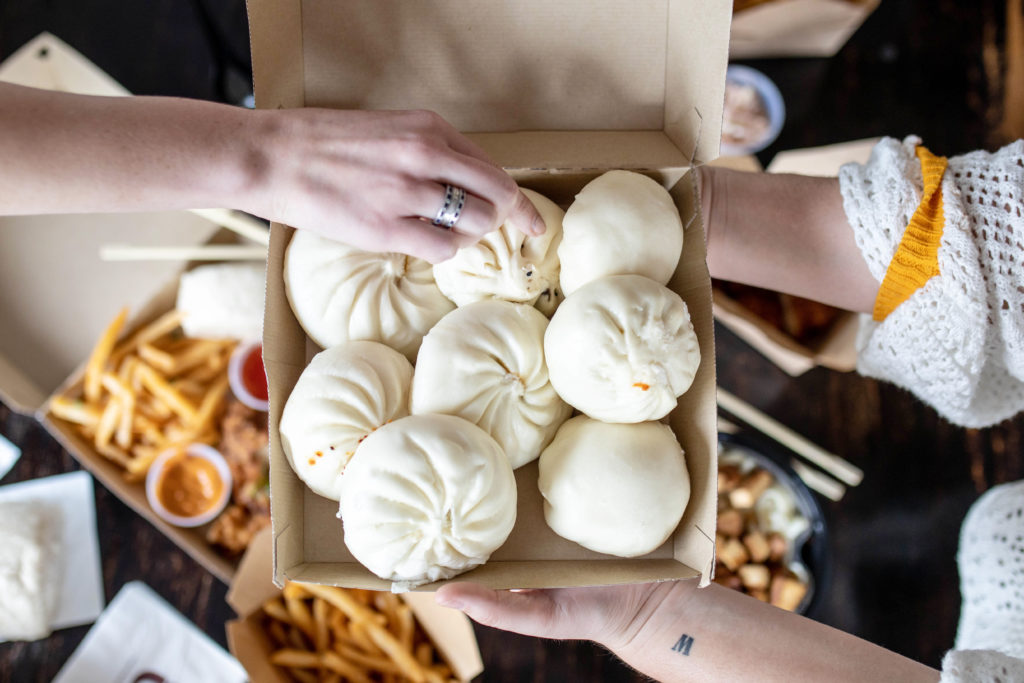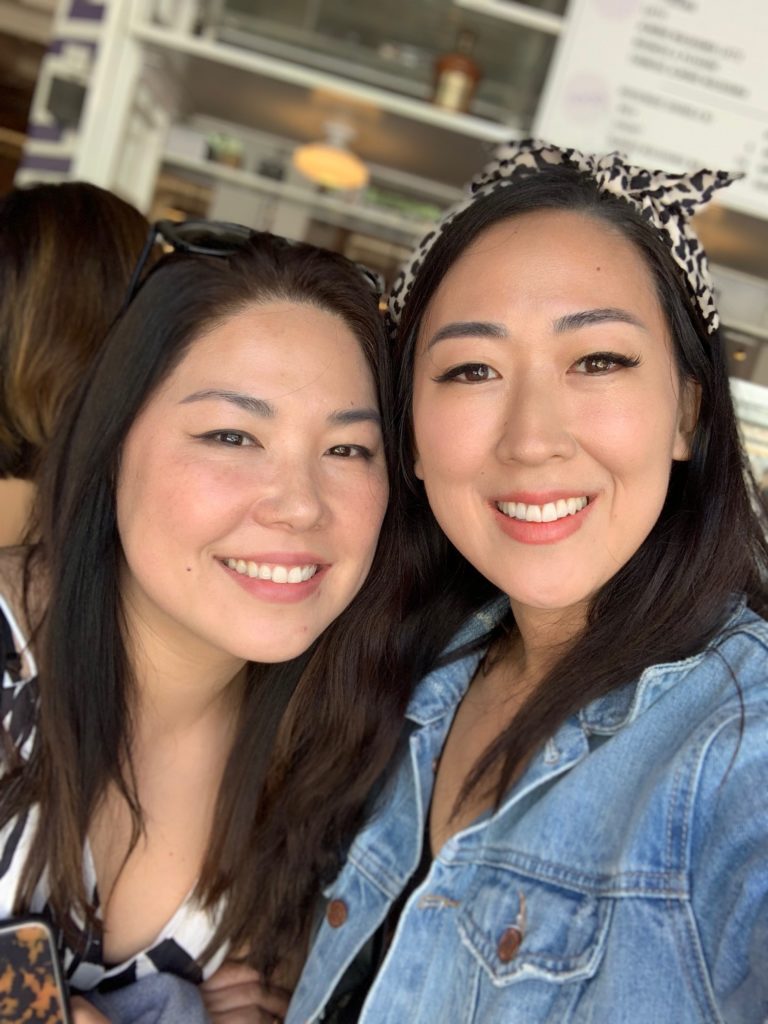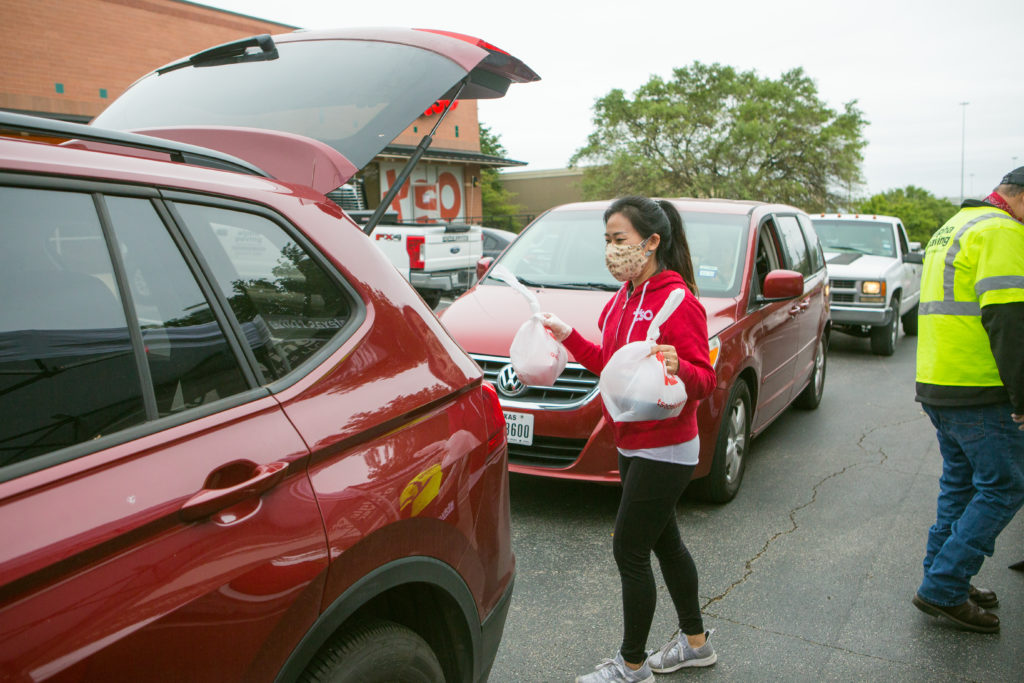Despite discriminatory anti-Asian rhetoric, the Chinese American community is resilient. Here’s how Tso Delivery and Bao’d Up are giving back.
By Joanne Xu

Photo by Julia Keim
Alex Wu and Eunice Tsang, owners of respective Austin-based Chinese restaurants, both started businesses to take care of family.
Wu and his business partner, Chef Ting Lin, started Chinese American concept chain Bao’d Up for their kids. Wu and Lin weren’t impressed with the grilled cheese and chicken finger meals that their kids’ schools were serving. Instead, they opted to pack their lunches with Chinese baos: buns filled with various combinations of sweet and savory fillings. Peers at school grew curious about the flavors that wafted from these soft white buns and started asking for bites. Their positive reactions inspired Bao’d Up, a menu of Chinese comfort food that’s delivered through a system of automated technology and in-store food locker pickups.
Eunice Tsang, her husband Angell, and their two longtime friends, Min and Jenna Choe, opened Tso Delivery to honor their parents’ legacies. Like many first-generation Chinese immigrants, their parents were blue-collar small-business owners who worked tirelessly against language barriers and social isolation so their kids could one day aspire to more. And they did. Angell Tsang went into software engineering and Eunice Tsang became a nurse before raising a family of her own. Yet ironically—and much to their parents’ confusion—the four friends eventually gravitated back toward the restaurant industry, determined to reinvent the Chinese delivery businesses their parents had merely started for survival.
“We thought, we’re not going to run from it,” Eunice Tsang says. “We’re going to take it and reinvent it and build on it in a way that’s relevant to our generation.”
Wu and Eunice Tsang are just two of many Chinese American restaurateurs that have spent years contributing to Austin’s vibrant and diverse food culture. They’ve been friendly neighbors, respectful tenants and positive citizens. Now, amidst an unprecedented global pandemic that’s rattled at-risk communities, including people of color, they’re setting aside personal anxieties and safety concerns to serve their greater community.

When COVID-19 first emerged in Wuhan, China, second-generation Chinese Americans collectively held their breath as they frantically checked in with overseas family. They registered early on that the coronavirus would inevitably force a change in their current way of life.
“Being Asian and Chinese, we saw how this thing rolled out in China prior to the U.S.,” Wu says. Bao’d Up started limiting its dining area capacity as early as a week before Austin’s first shelter-in-place order was announced.
As COVID-19 began spreading across the U.S., so did a wave of discriminatory anti-Chinese rhetoric. President Donald Trump and far-right media pundits perpetuated it as the “Chinese virus.” News reports circulated of Chinese American millennials being spat on and stalked during walks to the gym; Asian cashiers were verbally berated for doing their jobs; elderly men and young boys were physically attacked in the streets. And though medical experts reiterated that race does not make a virus contagious, Chinese-owned restaurants were vandalized and boycotted.
By March, Wu says Bao’d Up’s sales were down by at least 50 percent. Tso Delivery, which was still recovering from cancelled SXSW catering jobs, noticed less orders, too.
Eunice Tsang remembers getting calls from family in New York and San Francisco, cities with more concentrated Chinese populations than Austin. “They were reaching out to us concerned about these articles and about Chinatowns becoming ghost towns,” she says.
Despite growing fears of financial instability and personal safety, Wu, the Tsangs, and their respective businesses poured their faith and trust into the same Austin community they’ve always championed. Even though business was already suffering, Bao’d Up’s Mueller location started donating 10 percent of its sales to the neighboring Thinkery to help cover costs while the museum’s doors were forced shut. Wu and Lin added Family Packs and Survival Packs containing frozen to-go baos to their menu at discounted prices to help overwhelmed parents.
The Tsangs and Choes at Tso Delivery pivoted their Tso Giving program to provide free meals for the service industry that’d been hit hard financially by coronavirus. By April’s end, they’d donated $45,000 in food to fellow Austinites. Inspired by the overwhelming amount of communal love, they pivoted again in May, donating an additional $50,000 in food to Austin’s teachers because “just like the restaurant industry, [teachers] had to change overnight,” Eunice Tsang says.

Tso Giving Campaign – Photo by Courtney Pierce
Restaurant industry supporters were also quick to help. Jane Ko, Austin’s resident food and restaurant blogger, leveraged her platform to support Hundred for Hospitality, a city-wide partnership with restaurants and agencies to serve 100 hot, free meals a day to service industry personnel, while also reimbursing food partners for participation costs. The fundraiser provided 4,000 local meals.
Ko, Eunice Tsang, and Wu aren’t alone; they’re just among the most visible testaments of the community’s resilience. Despite language barriers, social isolation and racial prejudice, Austin’s Chinese Americans are holding steadfastly onto one generation-spanning Chinese principle: Good food can resolve all differences and bring together the most unlikely people.
“Once they get to know the food, they’ll get to know the culture and the people,” says Wu.
For them, it’s the basis that their genuine and hopeful interpretation of the American spirit rests on. “I mean it’s your actions, right?” Eunice Tsang says. “COVID-19 can definitely bring out the worst. But during this time, you’re also going to see, not to be cheesy, what it is to be unified and one. What it means to be American.”
During my interview with Eunice Tsang, she interrupted me mid ramble to tell me she’s so proud of me for writing this article. It feels like she’s speaking to me through our whole Chinese American community, and for a second I contemplate letting a tear shed while on the phone with a source. She keeps repeating a sentiment that seems to resonate throughout all of my conversations for this story: “We love our city. We are a part of the city. We are a part of this city.”
Coming off of the most disjointed celebration of Asian Pacific American Heritage Month in recent times, Eunice Tsang, Wu and the rest of the community are not asking for praise from the Austinites they serve—only loyalty.


